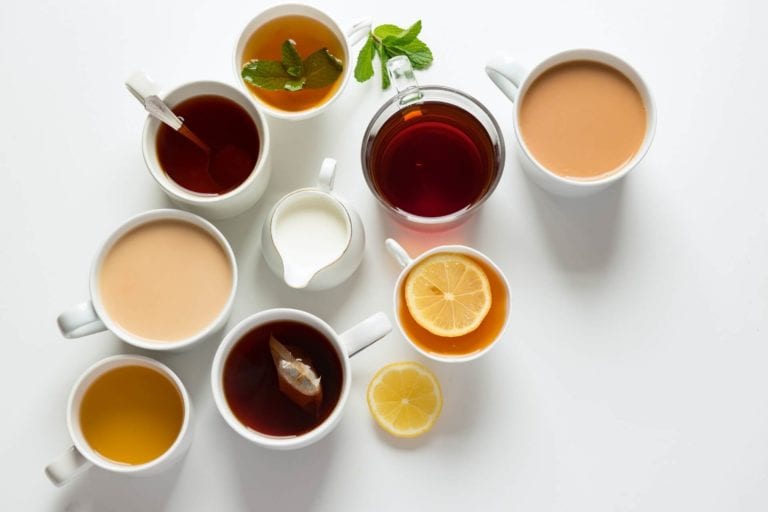Although you can’t consume any calories, there are certain tasty beverages that you can enjoy during your fasting period. What is the best tea for intermittent fasting? There are quite a few really, but there are 10 that rise to the top of the list because of the additional benefits they give you while easing the cravings without breaking your fast. Did you know that there are different kinds of tea that can improve your physical health and mental processing? Some types of tea have been used for centuries as natural home remedies for various ailments of the body and mind. Out of the hundreds of various kinds of teas that are available, I’ve chosen the most highly recommended because of the additional benefits they offer, as well as the amazing flavors that they impart to make intermittent fasting less boring.
The 10 best teas for intermittent fasting
There is little that is better than having an amazing infusion of flavor when you’re doing intermittent fasting. Drinking water helps you to stay hydrated, but it’s also good to bring a bit of excitement into the mix. You can enjoy the variety of different flavored teas that make the fast less bland. The 10 best teas for intermittent fasting are:
- Green Tea
- Black Tea
- Ginger Tea
- Hibiscus Tea
- Roobios Tea
- Mint Tea
- Dandelion Root Tea
- Matcha Green Tea
- Oolong Tea
- Bergamot Tea
What makes each of these teas a good option?
We’re taking a deeper look at the advantages of each of the 10 best teas for intermittent fasting. The reason I recommend these specific teas is because they’re delicious, they add zero calories, and they also provide health benefits that are in line with the purpose of most types of fasting. There are differences from one type to another. In case you’re not familiar with some of them, I’ve included an overview. Here’s a breakdown of the reasons why each tea in the list along with the benefits, pros and cons, and the amounts that you should drink when fasting.
General benefits of drinking tea
There is a scientific explanation to support the reasons for drinking tea more than you drink coffee during a fast. While coffee can make you feel jittery, tea can do the opposite. The caffeine and other compounds in coffee cause your body to release three major stress hormones which include epinephrine, norepinephrine, and cortisol. This can lead to feeling on edge, jittery, or make your heart rate go up. Tea leaves contain caffeine, but they also include the amino acid I-theanine.
Drinking coffee releases the stress hormones cortisol, epinephrine, and norepinephrine. This is a significant reason why people experience higher heart rates, jitters, and fidgety feelings after one or a few cups of coffee.
However, tea leaves contain a calming amino acid known as l-theanine. This powerful ingredient has the opposite effect of caffeine: it calms your nervous system and supports reduced stress levels, lower heart rates, and healthy blood pressure.
When you combine l-theanine with the caffeine in tea, you get the best of both worlds: sustained focus, higher cognitive function, more positive moods, and better stress management.
According to the l-theanine effect in tea, increased alpha wave activity in your brain brings about a state of calm focus/alert relaxation while reducing the caffeine’s stimulant effects.
Overview of the 10 best teas for intermittent fasting
1. Green Tea
Green tea has a light color and a mild flavor compared to black tea. It’s the healthiest ranked type of tea coming in second after pure water. Green tea contains compounds called catechins that help to boost energy and to promote weight loss. The catechins along with the caffeine in green tea work together to accomplish these two benefits. This type of tea is also loaded with strong antioxidants, known to boost your immune system and support cell health.
The only potential side effect of green tea is from the caffeine. It’s important to note that the caffeine in coffee is different from the kind found in teas. It’s a milder form that is still a stimulant, however, it isn’t as hard and it is less likely to cause the jitters unless it’s overdone. It gives you a timed-release boost of energy and some green tea drinkers are pleased with increased focus and clarity in their mental processing. Best of all, green tea doesn’t break your fast unless you add other ingredients. You can drink as much green tea as you like during the fast, but remember that it does contain caffeine, and overdoing it can give you the side effects of this stimulant. To gain all of the health benefits of tea it is important to drink at least 3 cups throughout the day.
2. Black Tea
Black Tea is dark in color and it has a bolder flavor. While coffee contains 95 mg of caffeine, black tea only has 50 mg. If you’re trying to quit drinking coffee, black tea is a good transitioning beverage that is less likely to make you feel jittery or stressed. There are several different flavors of black tea available that you can drink during an intermittent fast. It is a mild stimulant that can help you to increase your focus. As with green tea, the caffeine in black tea is more mellow. It contains zero calories if you don’t add any other ingredients.
You can choose from several different kinds of black tea. Regular black tea provides you with a rich and robust flavor. Some black teas are made with spicinesses, such as chai tea that contains cinnamon and other spices, or a citrus blend, and more.
3. Ginger Tea
Ginger Tea is the best type of tea to drink if your stomach is feeling upset. It is made with ground ginger root, which is known to contain a variety of healthy compounds. It offers the properties of antiviral, antibiotic, and much more. Ginger makes the body feel warmer and stimulates healthy circulation. It is also an aid to digestion and it boosts the functioning of your immune system
Ginger has a powerful aroma that stimulates your senses and gives you an extra feeling of energy. Ginger tea is the type that is most often used if you’re feeling under the weather. It’s not just for times when you’re ill. It is also an excellent way to stimulate your brain and to increase clarity and focus. Ginger has been used for centuries in natural home remedies to treat a variety of health issues.
4. Hibiscus Tea
Hibiscus Tea is made from the flower of the Hibiscus plant. Like ginger tea, it has been used for centuries for its healthy effects on the body. This kind of tea promotes healthy skin for a more youthful appearance. It is also a wonderful detox for your liver. Hibiscus Tea is filled with antioxidants that give your immune system a boost for better overall health and resistance to illness.
Hibiscus Tea doesn’t contain the caffeine that so many other teas contain, but it offers a crisp and refreshing flavor that can awaken the senses. It’s one of the most highly recommended teas for body maintenance of the internal organs and skin health.
5. Roobios Tea
Roobios Tea, like Hibiscus tea, is a caffeine-free choice. It’s one of the most popular teas to drink in the evening time, in the hours before bed. This flavorful tea is ideal for body support when you’re fasting because it helps your body to metabolize fat. This makes it an excellent choice when you’re fasting to lose weight.
6. Mint Tea
Mint Tea has a soothing effect on the stomach. The minty flavor is cool and flavorful but this tea also offers some excellent health benefits. The compounds that are found in the mint have been used since ancient times to aid in digestion. It is also known to reduce inflammation in the body and to relieve pain. Mint tea is also used to help de-stress the mind as well as boosting your immune system. It’s also good for improving bad breath with a minty freshness.
7. Dandelion Root Tea
Dandelion Root is another herbal-based tea that has several health benefits for your body. It contains compounds that strengthen your immune system to help you to ward off viruses and other health conditions. It also helps your liver to get rid of toxins faster than most other detoxification teas. It is also a good choice for helping to balance the sugar levels in your blood. If you have digestive issues, Dandelion Root Tea helps to ease the discomfort and it is also a good natural remedy for heartburn.
8. Matcha Green Tea
Matcha Green tea is made with ground green tea leaves and it is known for its extra dose of caffeine. It is a good transitioning beverage if you’re trying to kick the coffee habit. This tea contains 75 mg of caffeine in each cup. It’s used to substitute energy drinks during intermittent fasting, but it contains no calories so it won’t break your fast. Other healthy ingredients in Matcha Green Tea include catechins and polyphenols.
Even though Matcha Green Tea contains more caffeine than most other types of teas, it can actually support a healthy response to stress and make you feel calmer. This amazing tea is used to enhance your mood and to elevate your ability to focus if there is an important project that you’re trying to complete. The health benefits go on. It also supports the health of your cardiovascular system, and it can help if you’re trying to manage your weight. Matcha green tea helps to promote a healthy metabolism so you can process foods, convert calories to energy, and burn them more easily.
9. Oolong Tea
Oolong Tea comes in a variety of types. You can choose between dark varieties of Oolong, which are very similar to Black Tea, or the more mild light versions that are more like Green Tea. It is a versatile type of tea that has its history and origins in Japan. Some studies have shown that this tea can give you an extra boost of energy and it can help to stimulate focus and mental clarity. It has similar benefits of Green Tea but in a more concentrated form.
10. Earl Grey Tea
Earl Grey Tea is flavored with the oil of bergamot. This is a citrus flavor that is also bold and stimulating. There are no calories in Earl Grey Tea, and it offers a rich and bold beverage to stimulate your senses. It is most often consumed in the morning to noon hours because it provides a steady energy infusion that elevates your senses. It is also filled with antioxidants that support your immune system and aid in the development of healthy cells throughout your entire body.
Conclusion
Tea is one of the best alternatives to water when you’re doing intermittent fasting. The best thing about drinking tea is that thee are so many different teas that you can choose from. The flavors can be enticing, and help to alleviate cravings for something less bland than water. If you drink at least three cups of tea a day when you’re fasting, you can also gain a host of health benefits.
I recommend comparing the different health benefits that are offered from the variety of different tea choices, to help make your intermittent fasting periods even more productive for helping you to achieve a healthier body and mind. The 10 best teas for intermittent fasting were all chosen because of their unique compounds and properties. They’re loaded with healthy compounds that can help you to tackle some existing health issues so you feel better both physically and mentally.


11 thoughts on “10 Best Teas for Intermittent Fasting”